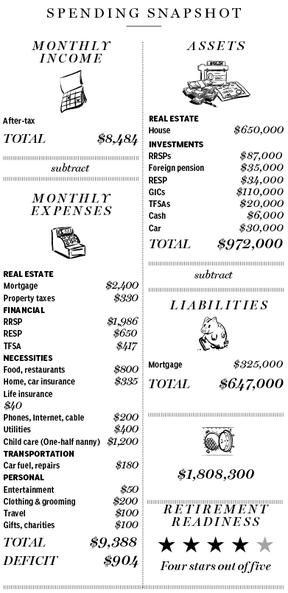Funny Td Add Kid Help Mom Police Car
Gifts from mom and dad help this couple stay afloat
A new car and thousands of dollars a year from their parents help this family afford to keep mom at home with the kids

Reviews and recommendations are unbiased and products are independently selected. Postmedia may earn an affiliate commission from purchases made through links on this page.
Betting a family's future on one income is risky, but that is precisely what a couple we'll call Nancy, 33, and Bruce, 38, are doing. Raising three pre-schoolers ages 1 to 5, Nancy, who spent much of her working life abroad, has decided to let her career in management consulting hibernate. Bruce, an industrial engineer who worked in Europe for several years, is paying the bills with his $132,400 annual pre-tax income and $15,000 annual bonus. The family's cash flow is sound — for now. But if they lose Bruce's income, they could be in dire straits. Bruce, Nancy and the kids live relatively modestly in Toronto, though they have do have one luxury — a nanny Nancy shares with a neighbour. If Nancy eventually tires of the diaper biz and wants to return to the business world, the family's total income would rise. Their problem, therefore, is to balance Bruce's good income and future prospects with family security now and in future.
Family Finance asked Dan Stronach, a financial planner who heads Stronach Financial Group in Toronto, to work with Bruce and Nancy. He notes that raising children in an expensive city like Toronto, even on Bruce's income, is hardly a breeze. Nancy gets $100 per child per month via the Universal Child Care Benefit. On top of that, her parents give $6,000 a year as gifts for the kids and, last year, bought Nancy and Bruce a new car.
Put it all together, and their pre-tax income, including the annual gift worth half as much again were it taxable income, would be $160,000. They are hardly poor but, incredibly enough, their financial lives are strained.
[np-related]
Money Management
After tax at an average 35% rate on $147,400 of actual income plus untaxed parental gifts, they have $101,810 a year to spend, or about $8,484 a month. They run a deficit even after Nancy's parents' gifts are included in the budget, but the shortfall is actually the result of $3,053 monthly savings in registered accounts. They are electing to generate future income rather than to spend now. They are not in any sense going broke.
Nancy will have lost perhaps six years of work experience by the time her youngest child is ready for school, but she is confident she could regain the career she put into hibernation. Bruce plans to work another couple of decades, the timing and lifestyle of his retirement to be determined by family income in the years between now and then and, of course, on the returns they get from their investments at age 60 — his target retirement date.
Bruce and Nancy's earnest savings habits have already established a solid registered educational savings plan. It has assets of $34,000. They add $650 a month. In 12 years when their eldest child begins university, the fund will have $162,500. If money is apportioned to the children in thirds and the fund grows at 3% a year for another 20 years from the beginning of withdrawals to the youngest child's fourth year of university, the fund would be able to supply each child with about $14,000 a year, Mr. Stronach estimates.

Retirement Plans
If Nancy does not return to her career and, assuming Bruce's salary, driven by inflation and promotions, rises to $225,000 on the eve of his retirement at age 60 in 2034, the couple will have total assets of $2-million. No estimate can be made for CPP that Nancy may receive, for she may not return to work. Nevertheless, their capital can provide pre-tax investment income of $108,000 a year in future dollars. Bruce can draw CPP benefits inflating at 3% a year to $22,344 in 22 years and reduced by 36% of the full rate to $14,300 a year, Mr. Stronach estimates.
Seven years later, Bruce can take OAS benefits inflating at 3% a year to $15,273 a year for total future pre-tax pension income of $29,573 a year. When she is 67 in 2045, Nancy will receive $17,716 a year in Old Age Security benefits that will have risen with indexation. The couple's total income will then be $155,289 before tax. Assuming the couple splits pension income and each pays tax at a 30% average rate, they will have after-tax income of $108,700 and expenditures raised by inflation to $97,470 a year. They will have discretionary savings for travel, gifts to their children or to good causes, Mr. Stronach says.
On a strictly financial basis, there will be no need for Nancy to return to work, the planner says. If she does want to work, however, and if she earns $75,000 a year beginning in 2018, the couple's total retirement income will rise to $242,280 in 2043 dollars with all other assumptions remaining the same but investment income increased and CPP added at $12,000 a year. With all pension income split and taxed at 30%, the couple would have $190,600 a year to spend for expenditures still at $97,470 a year. They will have even more choices for spending, for their children, for legacies or for donations to good causes.
"This couple should be able to live quite well on Bruce's income," Mr. Stronach says. "They can educate their children and retire in comfort as long as Bruce's career thrives. But if his career stumbles and if Nancy cannot replace 70% of his income, then the family would not have the same level of comfort, nor would there be the same level of retirement security. Inevitably, maintaining a family even on a single income is chancy."
Need help getting out of a financial fix? Email andrewallentuck@mts.net for a free Family Finance analysis
Source: https://financialpost.com/personal-finance/family-finance/gifts-from-mom-and-dad-help-this-couple-stay-afloat


0 Response to "Funny Td Add Kid Help Mom Police Car"
Post a Comment